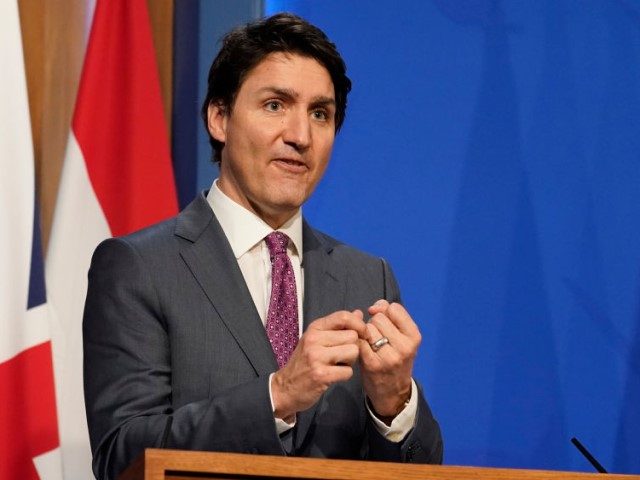Canadian Prime Minister Justin Trudeau linked “flat-earthers” to “anti-vaxxers” while warning of online “disinformation” during a town hall event Monday in Ottawa, ON.
Trudeau framed the government policy debate around digital censorship as a competing balance between degrees of free speech and the state’s ability to “protect” citizens from “disinformation”:
Governments have very limited tools to protect people in an online world, which is a good thing. It allows for a tremendous amount of freedom — freedom of expression, freedom of discovery — no oppressive governments controlling what you see, what you want, but it also opens us up to a tremendous amount of crap, of hate speech, of things that are illegal, but also things that are just going to bring us down roads where we’re going to get lost.
The prime minister then linked “flat-earthers” to “anti-vaxxers” via a shared “anti-science” identity:
I remember a few years ago before the pandemic, getting really fascinated by flat-earthers, and trying to understand — sort of — the thinking behind them, of people who decided actively to create an identity for themselves that was to just clearly reject what science settled thousands of years ago with the ancient Greeks, and that there’s no real contrast to.
It’s more of an identity thing rather than a reasoning thing, and to have people sucked into that, it was fascinating to try and see what it was all about.
And of course, we went on to understand the phenomenon of anti-vaxxers and anti-science, anti-skeptics, and this rise in these echo chambers that are validating this kind of thinking in ways that have real consequences.
There are people in Canada who died surrounded by their families because they truly and genuinely believed that the vaccine was more dangerous than the virus, and it killed them.
Canadians must contemplate how to “responsibilize” technology companies with control over the digital “public square,” Trudeau added:
My responsibility as prime minister is to try and keep everyone in this country as safe as I possibly can, but I can’t protect everyone from every bit of disinformation on the Internet. So we have to have reflections of how we move forward, how we responsibilize the companies that are controlling so much, the private companies that are controlling so much of the public square you now live in that doesn’t have police paid by your taxes to keep you safe.
It doesn’t have rules around businesses to regulate so you don’t get scammed by the corner store. This is the new world we’re in that we’re going to have to try and adjust to, and I can tell you, I’m worried about the direction we’re going.
Trudeau also called for increasing the share of women composing the technology sector’s workforce. Technology forms with higher proportions of female employees relative to the industry average perform better financially, he claimed. He framed his position in the context of “diversity,” “gender balance,” and “inclusive policies”:
If half of your population isn’t fully engaged in part of creating those technological solutions for the future, you’re missing out on an easy opportunity to challenge yourselves properly as a company even more.
We’ve all seen the stats on boards. For example, companies that have more women on their boards have made it through economic shocks a lot better than companies that haven’t, but that goes the same for companies with a higher proportion of women engineers, and folks in the tech industry.
People are starting to see that gender balance and inclusive policies are not just about sort of ticking a box or being nice or looking like you’re a modern progressive company, it’s actually about better solutions and better quality of output.
Canadians trust their federal government, concluded Trudeau.
“‘Peace, order and good government’ are good mottos in tough times,” he stated. “People understood: trust our science, trust the doctors, trust the government is going to be able to be there to support you when you stay home and can’t go to work, but you can still pay the rent and pay groceries.”
Follow Robert Kraychik on Twitter @rkraychik.

COMMENTS
Please let us know if you're having issues with commenting.